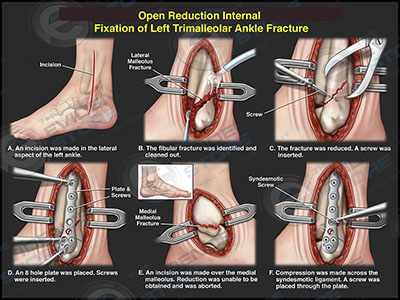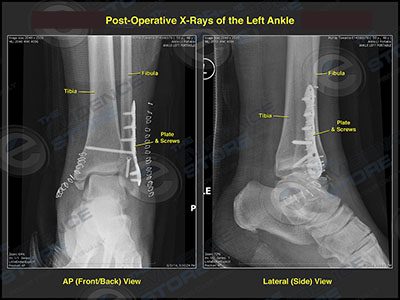Open reduction and internal fixation (ORIF) is a surgical procedure used in serious fracture cases to stabilize and repair broken bones. You may require an ORIF procedure if you are in an accident and suffer trauma to your bones, resulting in significant injuries.
 There are three bones in your ankle joint: the tibia (shinbone), the fibula (the smaller bone in your leg), and the talus (a bone in your foot). Many types of trauma sustained in accidents can damage any of these bones. A personal injury accident may be so severe that the trauma can cause the bones to move out of alignment.
There are three bones in your ankle joint: the tibia (shinbone), the fibula (the smaller bone in your leg), and the talus (a bone in your foot). Many types of trauma sustained in accidents can damage any of these bones. A personal injury accident may be so severe that the trauma can cause the bones to move out of alignment.
If your ankle fracture is severe, you may require an orthopedic surgeon to perform an ORIF to align and stabilize your bones. During an open reduction and internal fixation surgery, orthopedic surgeons physically implant hardware, such as screws, plates, rods, wires, or nails to your bones.
Why would I need an open reduction and internal fixation surgery?
 If you have been a victim in a New Jersey motor vehicle accident, tripping or falling accident, or suffered a sports injury from skiing, snowboarding or tobogganing, you may suffer a severe fracture that requires ORIF to fix and heal your bones. People usually require ORIF surgery when:
If you have been a victim in a New Jersey motor vehicle accident, tripping or falling accident, or suffered a sports injury from skiing, snowboarding or tobogganing, you may suffer a severe fracture that requires ORIF to fix and heal your bones. People usually require ORIF surgery when:
- The leg bones are severely out of alignment;
- The fractured bones penetrate through your skin;
- The bones have been shattered into several pieces;
- The bones are not stable.
For these types of injuries, your surgeon will perform ORIF to restore your bones to their proper position and stabilize them so you can heal.
What are the risks of ankle fracture open reduction and internal fixation?
There are always potential complications that occasionally happen during ORIF, as is the case with any surgical procedure. Possible complications include:
- Pain around the fracture site and pain associated with the metal hardware, screws and rods inserted into your bones;
- Infections;
- Nerve and muscle damage;
- Future arthritis;
- Additional medical costs and expenses to care for the injury after surgery.
Potential that the fracture may not heal properly, in which case you would have to undergo a second ORIF to repair and/or insert additional hardware into your bones to fix the fracture.
It is critical to factor in all the costs and expenses associated with an ORIF surgery, and the aftercare associated with this severe injury when negotiating a potential settlement with the insurance company or the party responsible for your injuries. Once your NJ personal injury case settles, it is closed for good and you can never reopen again to seek compensation for future medical care or expenses. Your NJ personal injury lawyer most have the necessary knowledge and experience to engage in settlement negotiations to make sure that you are fully compensated for your pain, suffering, medical expenses and any other economic damages as a result of your injury.
Reach Out for Help
If you or your family member has been a victim of an accident due to someone else’s negligence and as a result suffered a severe injury which requires ORIF, please feel free to contact a NJ injury Attorney Howard Lesnik. I handle NJ personal injury cases on a regular basis. Please contact me now by email, by phoning 908.264.7701, or by completing the form to the right to schedule your complimentary 30-minute strategy session.







